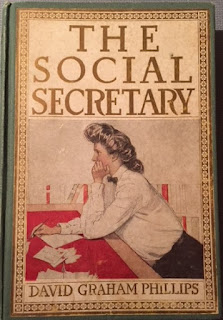a review by Rich Horton
Sometimes the author's life story is far more interesting (and shocking!) than the events of their novels. So it is with David Graham Phillips, who was murdered, at the age of 43, by a man who thought one of Phillips' characters was based on his sister, in a libelous fashion. (The killer then committed suicide.)
David Graham Phillips was another of a long string of influential and popular novelists from Indiana who were active around the turn of the 20th Century. (Others include Booth Tarkington, Meredith Nicholson, Charles Major, George Ade, James Whitcomb Riley, and Theodore Dreiser.) Phillips was born in 1867. After college (Asbury College in Indiana (now DePauw) and then Princeton) he worked as a journalist in Cincinnati before moving to New York. He had much success in this field, and was considered one of the important "muckrakers", notably publishing an article called "The Treason of the Senate", which was one impetus for the eventual passing of the 17th amendment, which allowed for direct election of Senators. His first novel, The Great God Success (1901) sold well enough that he quit his newspaper position and concentrated on freelance investigative journalism as well as novels. He eventually published over 20, written over about a decade. It seems that most of them dealt with significant social issues, particularly the social and economic position of women. (He never married, living with his sister Carolyn until his death in 1911. She prepared his last novels for publication, and I wonder if she had a hand in writing them.) His most famous novel might be Susan Lenox, not published until 1917, which concerns a prostitute.
 |
| (Cover by Clarence F. Underwood) |
In this context The Social Secretary seems an outlier. It is very short (about 25,000 words) and very light. It was published in 1905 by the Indianapolis firm of Bobbs, Merrill, though my copy is a Grosset and Dunlap reprint, from about the same time. It is illustrated by Clarence F. Underwood, with "decorations" by Ralph Fletcher Seymour. (I am not quite sure what the "decorations" are meant to be, unless that's a credit for the design of the book.)
The story is told via the supposed diary entries of Augusta (Gus) Talltowers, a young woman of a very good Washington, D.C. family that has fallen on hard times. Forced to get a job, she becomes the social secretary for Mrs. Burke, the wife of a new Senator from a Western State. The Burkes are relatively uncultured, "common", and Gus determines to use her knowledge of the social ways of DC, along with the Burkes' money, to establish them in society, to the political benefit of Mr. Burke.
Along the way Gus takes very much to Mrs. Burke -- "Ma" as she insists on being called. Gus doesn't take as easily to Bucyrus Burke, the eligible and appropriately aged scion of the family, though her friends try to persuade her to set her cap for him -- he'll have enough money to solve her family's financial problems. But "Cyrus" just seems silly to Gus. Gus has a suitor of her own, a Colonel Lafollette, but she finds him boring. She is more interested in the impoverished Robert Gunton, a friend of the Burkes.
However, as Gus's efforts on behalf of the Burkes are a smashing success, Robert falls for Nadezhda, the dangerous sister of the Ambassador of an Eastern European nation (no name given, I suppose "Ruritania" will do). A mild diplomatic incident is threatened. Also, Ma Burke has something of a nervous collapse from too much partying. And somehow Cyrus seems less annoying than he had ...
Well, of course, all works out swimmingly. Robert Gunton's masterly ways tame Nadezhda and charm her family. Ma Burke pulls through just fine. And Cyrus finally figures out how to properly court Gus. It's a very slight book, pleasant enough but really a bit less fun than I had really hoped. It is worth noting that besides the romance plot there is a bit of neep about the social world -- and how that affected the politics -- in Washington at that time -- it's minor stuff, but it's of some interest.
No comments:
Post a Comment